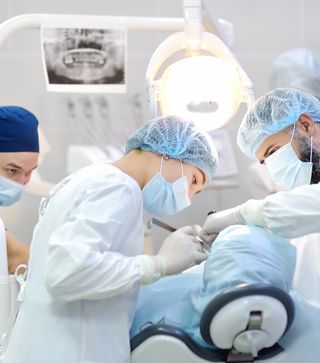Dental Surgery
Specialist diagnosis and treatment of disorders affecting the facial composite and skeleton.

Maxillofacial and oral surgery are recognised specialties of highly trained and qualified surgeons who perform corrective surgery for conditions affecting the maxillofacial area, including the head, neck, face, and jaw.
In particular, when it comes to the mouth and jaw, dental surgeons can perform surgeries to repair injuries and trauma, or to enhance the appearance of these areas. For those lacking functionality or confidence in their mouth and jaw, this can be a good option to improve health and happiness.
Dentists in Australia require an additional three to six years of training to qualify as an oral and maxillofacial surgeon.
How does dental surgery work?
Your dentist or doctor will be the one to recommend surgery to address whatever issue or illness you’re facing. As this could be anything from removing an impacted and infected wisdom tooth to repairing a cleft lip, the surgery itself will vary greatly from one to another.
Generally speaking, however, the process will begin with a series of consultations, including X-rays and physical inspections. Your dentist or doctor may refer you to a specialist for surgery, although some dentists have completed the training and have the experience to do dental surgeries themselves.
Your health professional will talk you through each step so you know what to expect from the surgery itself, recovery time and expectations, and any follow-up care you may need.

What does dental surgery treat?
Maxillofacial surgery treats a wide variety of physical issues relating to the face, neck, jaw, and head. In the realm of dentistry, this is usually any areas that affect the health of your teeth, gums, and mouth, such as:
- Surgery where dental implants are required to attach hearing aids
- Complex tooth extractions
- Dental surgery on medically vulnerable or compromised patients
- Bone grafts
- Corrective surgery on jaws
- TMJ disorder
- Reconstructive surgery to fix bites
- Tumour and cancer surgery
- Snoring and sleep apnoea corrective surgery
- Cleft lip and palate surgery
What to expect from a dental surgery appointment
Prior to any surgery, your health professionals will ensure you know exactly what to expect, any risks involved, what the recovery will look like, and more.
- You will have x-rays and other check-ups prior to any surgery
- You may be referred to a specialist and have an appointment prior to surgery
- You will be given instructions for the days and weeks leading up to surgery, such as to stop drinking or smoking, and whether you can eat before your surgery
- You will either be given a local or general anaesthetic for surgery
- The surgery itself can last anywhere from an hour to several hours
- In most cases, you will be required to have someone else drive you home following surgery, or you may be kept for observation
- Recovery time will vary greatly depending on the surgery
- You may be given antibiotics or other medications to help the healing process
- You will likely be asked to return for a follow up appointment a week or more after the procedure
Recovering after dental surgery
The recovery time and process will depend on the type of surgery you had.
Some surgeries, such as wisdom teeth removal, will require several days of drinking smoothies and eating soft foods, while also potentially taking antibiotics. You may take over the counter pain medication to help manage any discomfort. As the removal sites heal, you will be able to return to normal foods.
For more extensive surgeries, the recovery time will likely be longer and slower. Your surgeon will likely prescribe medication to manage discomfort levels, and advise you to avoid smoking and drinking as you recover. There will be follow up check-ups, and possibly further follow up procedures if necessary.
For full details about the recovery process following maxillofacial surgery, speak to your dentist or surgeon to learn more about what to expect with your case.
Frequently asked questions
An oral surgeon is technically a dentist, as they must be registered through the Dental Board of Australia to work in this field. They also usually start out as dentists, but require a full additional six years of training to become an oral surgeon.
An oral surgeon is a specialist who treats conditions and injuries to your mouth, gums, jaw, and face. This can be anything from wisdom teeth removal to jaw reconstruction or tumour removal.
These specialists work to improve the health, functionality, and appearance of the mouth and face. If you have a dental program that requires surgery, your dentist will refer you to an oral or maxillofacial surgeon to carry out the work.
The cost of oral surgery varies depending on what you need. Speak to your oral surgeon about expected costs, and with your insurance provider to see how much they will cover.
Oral surgeries can be minor or major - it all depends on the surgery itself. Something as simple as a wisdom tooth removal can be completed in under a couple of hours and with local anaesthetic or even with a ‘twilight’ sedation, making it a minor procedure.
Some oral surgeries such as jaw reconstruction, tumour removal, or bone grafts are considered to be major surgeries, and will require you to go under general anaesthetic.

